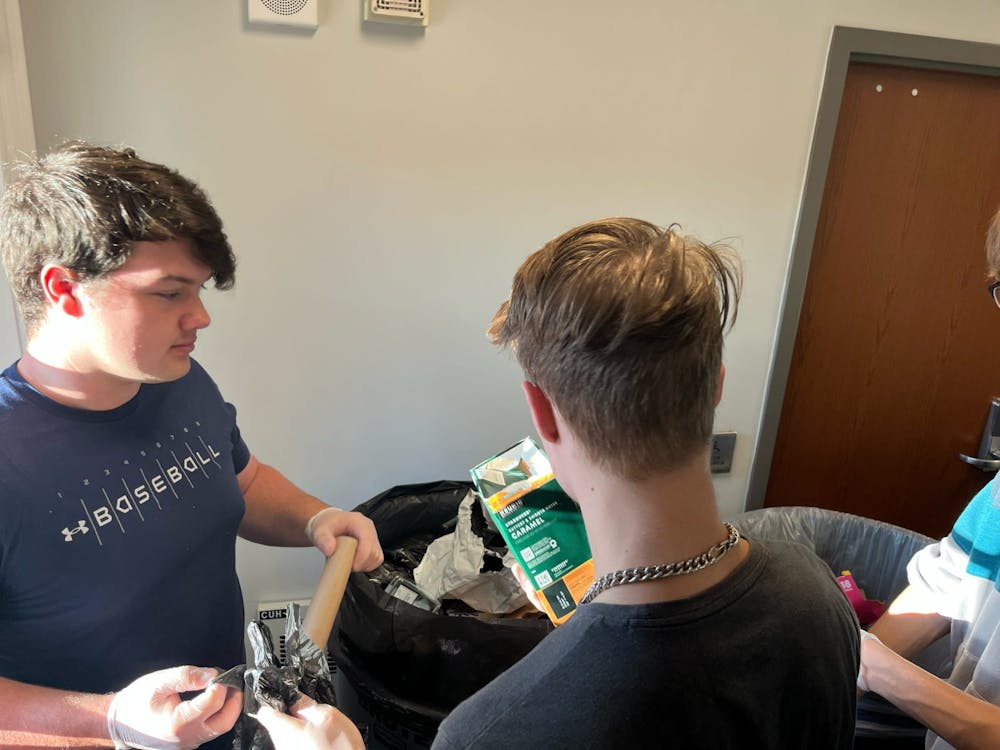Recycling may be an easy option when it comes to disposing of trash in most places on campus, but how do students sort their trash where they live? EcoReps’s biannual trash audits seek to provide an answer.
EcoReps, an organization that promotes sustainable living in Miami residential halls, has been completing a trash audit each semester since 2016. Members weigh trash from halls, sort out what could have been recycled and generate a percentage of total waste that could have been recycled.
Numbers vary, but the fall 2023 audit revealed figures as low as 4% at Young Hall, and as high as 25% at Dodds Hall. EcoReps also notes trends, availability of recycling bins — Hahne Hall had no recycling bin as of the 2023 audit — and odd standouts in their discoveries.

Several trash bins must be sorted through during each audit to determine how much trash could have been recycled. Photo provided by Austin Smith.
Lily Burbridge, a senior studying environmental earth science and member of an EcoReps leadership team, said the club is working to apply their findings to improve outreach.
“We’ve noticed that last semester we kind of had some gaps [in recycling], but the idea is that once we complete the trash audit, the EcoRep that lives in that building or whoever’s responsible for that building would send out that information,” Burbridge said.
The information is then compiled and delivered to residents with suggestions on how to improve recycling habits
“We send out those emails to hopefully teach people a little bit more about what should and shouldn’t be recycled,” Burbridge said.
Providing information about recycling is only one part of what EcoReps plans to do. With the implementation of tech like the OSCAR smart recycling assistant in the Armstrong Student Center, Burbridge hopes to see EcoReps help use the data for more extensive recycling programs.

Most dorms provide options for students to recycle, but the number of students who recycle from dorm to dorm varies. Photo provided by Austin Smith.
What began as a simple survey of the contents of trash in a few halls has since expanded into a campus-wide review of what residents throw away, from unopened food to unworn clothing. In recent semesters, members have been calculating the percentage of trash containing food waste.
Food waste numbers vary from hall to hall but reached as high as 27% at Minnich Hall in the fall 2023 audit. While students at some halls feel that their hallmates recycle well, they echo a concern that food waste in particular is handled poorly.
Enjoy what you're reading?
Signup for our newsletter
“There's [recycling bins] in our rooms, in the halls, and then larger ones, so I feel like people in Hillcrest do a good job of recycling or at least try to,” said Ciara Cyprien, a first-year Hillcrest Hall resident studying kinesiology. “A lot of food waste could be disposed of better.”
One challenge to organizing cohesive waste reduction and recycling efforts in halls is how varied waste handling can be from dorm to dorm. The last audit was heavy with inconsistencies in how residence halls set up their trash stations. It showed that each hall tends to employ its own trash systems and ways of telling residents what to dispose of, and how and where to do so.

EcoReps members must examine labels of items thrown in the trash to determine if they are recyclable. Photo provided by Austin Smith.
Consequently, the trash audit data of residence halls that are similar in size or population, or close in distance, can be completely different. Hillcrest had a recyclable percentage of 11%, while nearby Hodge Hall had only 4%.
To push back on this issue, EcoReps plans on having a representative at each dormitory. Having solutions tailored to the specific needs of each dorm may allow for more intuitive sustainability planning.
“We want to make sure that all of our residents and anyone who can get this information gets it,” Burbridge said.




